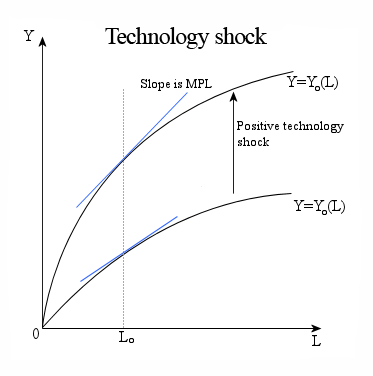User:OmranSharifi/sandbox
| This article was the subject of an educational assignment in 2014 Q1. Further details were available on the "Education Program:University of Toronto Mississauga/CCT110: The Rhetoric of Digital and Interactive Media Environments (S2014)" page, which is now unavailable on the wiki. |

The technology shock increases the output given the same level of, in this case, labor. The marginal product of labor is higher after the positive technology shock, this can be seen in the MPL (blue) line being steeper.
Technology shocks are events in a macroeconomic model, that change the production function. Usually this is modeled with an aggregate production function that has a scaling factor.
The term shock is defined as a sudden change in economic terms, therefore a technology shock is when there is a sudden change in technology to either benefit or worsen economic activity[Division of IAC. 1]. This type of shock has big effects on companies that are solely dependent on technology as their main source of labor or production, such as manufacturing plants or oil/energy extraction.
A technology shock affects an industry or firm's productivity, this may be a positive shock—increasing the output for a given set of inputs, or a negative shock—decreasing the output for a given set of inputs. Negative shocks are much less common than positive shocks as technology rarely moves backwards.
Positive Technology Shock
[edit]→ The Industrial Revolution is an example of a positive technology shock. The Industrial Revolution occurred between the 18th and the 19th century's where major changes in agriculture, manufacturing, mining, transport, and technology occurred [1]. [1]
What this did to the economy at the time was notable. It increased wages steadily over the period of time and it also increased population because people had the wages for standard living. This is an example of a positive technology shock, where it increases national and disposable income, and also increases the labor force. The Industrial Revolution also provided a much more efficient way to produce goods which lead to less labor intensive work [2].
Negative Technology Shock
[edit]→The oil shocks that occurred in the late 1970's are examples of negative technology shocks. When the oil shocks occurred, the energy that was used to extract to oil became more expensive, the energy was the technology in this case. The price of the capital and the labor both went up due to this shock[3], and this is a example of a negative technology shock.
More Examples
[edit]There are many examples of different types of technology shocks, but one of the biggest in the past couple of decades has been Web 2.0. Web 2.0 was a huge technological advancement in the e commerce business, it allowed for user interaction benefiting businesses in different ways[4]. It allowed for user feedback, ratings, comments, user content, etc. Web 2.0 revolutionized the online business as a whole, an example of a positive technology shock.
Real Business Cycle Theory
[edit]The Real Business Cycle Theory, or known as "RBCT", is the theory where any type of shock has a ripple effect into many other shocks. To relate this to current times the upward price on oil is a RBCT because of the negative technology shock that happened due to the raise in price for the process of extracting of the oil. Now due to this increase in price for energy to extract the oil, less people could afford oil which drove economic activity down and at the same time lessens a countries national GDP. Typically, a RBCT starts with a negative type of shock, which is why the RBCT is becoming less and less relevant in today's economics. More and more economists are arguing against the RBCT because very rarely can you have a negative shock on technology with the amount of advancements we are going through now[5].
See also
[edit]Notes
[edit]- ^ Landes, David S. (1969). The Unbound Prometheus: Technological Change and Industrial Development in Western Europe from 1750 to the Present. Cambridge, New York: Press Syndicate of the University of Cambridge. ISBN 0-521-09418-6.
- ^ Landes, David S. (1969). The Unbound Prometheus: Technological Change and Industrial Development in Western Europe from 1750 to the Present. Cambridge, New York: Press Syndicate of the University of Cambridge. ISBN 0-521-09418-6.
- ^ "Technology Shocks". http://economics.about.com/. Retrieved 12 August 2014.
{{cite web}}:|first1=missing|last1=(help); External link in|website= - ^ Kabir, Nowshade. "Web 2.0 in eCommerce". http://ezine.rusbiz.com/. http://ezine.rusbiz.com/. Retrieved 12 August 2014.
{{cite web}}: External link in|publisher=and|website= - ^ Shea, John (july 1998). "What Do Technology Shocks Do?" (PDF). No. 13. Cambridge: MIT Press. The National bureau of economic reasearch. Retrieved 12 August 2014.
{{cite news}}: Check date values in:|date=(help)
Cite error: There are <ref group=Division of IAC.> tags on this page, but the references will not show without a {{reflist|group=Division of IAC.}} template (see the help page).

